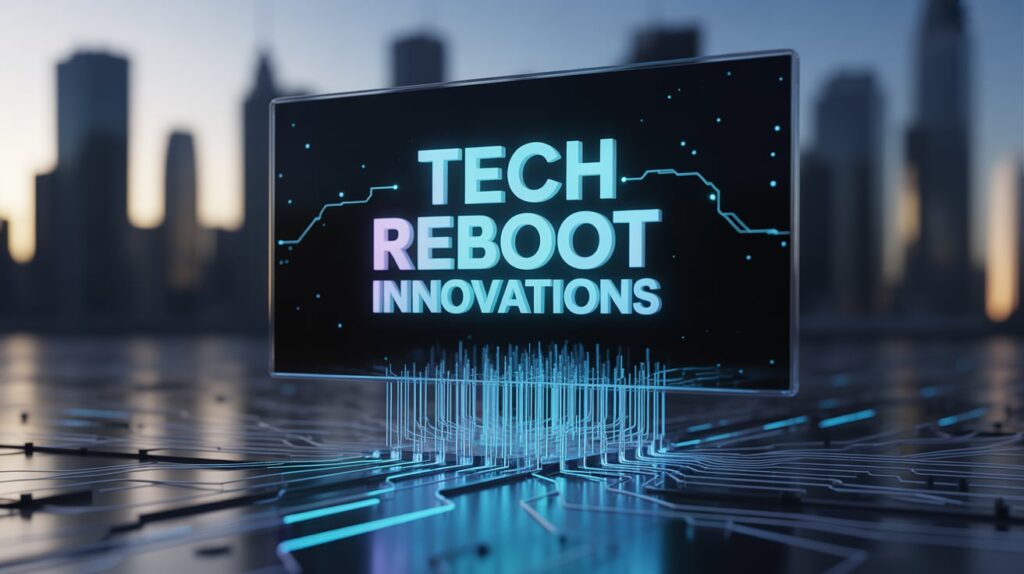Every few decades, business world face a moment where everything reboot. Right now, we living in that moment. A Tech Reboot is not just about new gadgets or shiny apps, it is a full reset in how companies work, how industries grow, and how customers interact with products. From healthcare to finance, from agriculture to entertainment, every field is feeling the shake of disruptive technologies and digital transformation.
This blog dive deep into how this reboot happening, what emerging tech trends are shaping future, and how businesses can adapt with next-gen infrastructure.
The Big Picture of Tech Reboot
What Tech Reboot Really Means
Tech reboot is more than innovation in tech. It is a wave of changes where old models stop working and new digital-first systems replace them. For example, retail without online stores now feels impossible. Same thing happening in education, banking, and even farming. The reboot is forcing industries to leave traditional models behind and embrace smarter, faster, automated systems.
Why Every Industry Is Affected
One mistake many leaders make is thinking only tech companies need to care. That is not true. A farmer today uses drones for crop monitoring. Hospitals run AI diagnostic tools. Banks rely on blockchain for secure transactions. Entertainment shifted from DVDs to streaming. It show clearly that no industry is safe from disruption.
Drivers Behind the Reboot
Several forces driving this transformation. Rapid adoption of internet, cheaper cloud storage, artificial intelligence, and demand for faster services all combine to create pressure. Customers also expect instant solutions now. If a company cant deliver, another one will. That pressure accelerate the reboot cycle.
Disruptive Technologies Changing Business
Artificial Intelligence at the Core
AI is not just hype anymore. It is running recommendation engines, fraud detection, chat assistants, predictive healthcare, and even factory automation. Companies that integrate AI into operations are cutting costs and improving speed. AI is now one of the biggest disruptive technologies in this tech reboot.
Blockchain and Decentralization
Beyond cryptocurrency, blockchain is transforming industries. Supply chain management use it for transparency, banking uses it for security, real estate for contracts. The idea of decentralization remove need for middlemen, which is powerful. Industries that depend on trust and data will be reshaped completely.
Internet of Things Expanding Everywhere
From smart homes to smart factories, IoT is making everything connected. Machines talk to each other, sensors give real-time updates, and businesses get deeper insights into performance. But IoT also creates data overload, meaning companies need next-gen infrastructure to handle it.
Digital Transformation and Emerging Tech Trends
Cloud Computing as the Backbone
Cloud is no longer optional. From startups to global giants, everyone is shifting workloads to cloud platforms. It reduce cost, give scalability, and support remote work. This is a key piece of digital transformation. Without cloud, modern business operations collapse.
Rise of Edge Computing
While cloud manage storage and apps, edge computing brings power closer to devices. This is essential for self-driving cars, real-time analytics, and smart cities. It reduce latency and improve decision making speed. Among all emerging tech trends, edge computing is one that quietly shaping industries.
Cybersecurity in Spotlight
As digital systems grow, threats also grow. Data breaches, ransomware, phishing, all increasing daily. Without strong cybersecurity, innovation in tech can backfire. This is why cybersecurity spending rising faster than ever. Companies now know digital trust is as valuable as product itself.
Next-Gen Infrastructure Building the Future
5G Networks Driving Connectivity
High speed networks mean more devices can connect and more data can flow. 5G is not just about faster video streaming, it is about powering self-driving cars, advanced IoT, and virtual reality experiences. This infrastructure is central to the tech reboot.
Green Technology Infrastructure
Sustainability is no longer optional. From renewable energy grids to smart buildings, industries adopting eco-friendly systems. Governments also pushing regulations, so companies must adopt these models or risk falling behind. This is where next-gen infrastructure meets environmental responsibility.
Hybrid Work Environments
After the pandemic, companies realized remote work is not temporary. Offices now built with hybrid models in mind. Collaboration tools, virtual workspaces, cloud systems all play role in creating a work culture that is flexible and productive. This shift is both operational and cultural infrastructure change.
Innovation in Tech and the Human Side
Skills Gap in Workforce
One of the biggest challenges in this reboot is people. Workers need new skills to manage AI systems, robotics, and digital platforms. Without training, even the best business growth strategies fail. Companies investing in skill development are the ones surviving disruption.
Ethical Concerns with Tech Adoption
Every new innovation bring new questions. AI decision making, data privacy, automation replacing jobs, all are real concerns. Society must balance speed of innovation with responsibility. Ignoring these questions can create backlash that slow adoption.
Opportunities for Small Businesses
The reboot is not only for big corporations. Small businesses can also use free digital tools, affordable cloud services, and social media to compete. In many ways, technology actually level the playing field. A small online store with right digital presence can reach global audience now.
Conclusion:
The Tech Reboot is not a future event, it is happening right now. From AI to blockchain, from cloud to IoT, from green infrastructure to hybrid work, industries are rewriting their own playbooks. This shift bring both risks and opportunities. Those who ignore it may fade away, but those who adapt can unlock huge growth.
The key lesson is simple: disruption is permanent. Businesses must learn to live in a world of constant reset. The industries that thrive tomorrow will be the ones that embrace disruptive technologies, digital transformation, emerging tech trends, innovation in tech, and next-gen infrastructure today.




